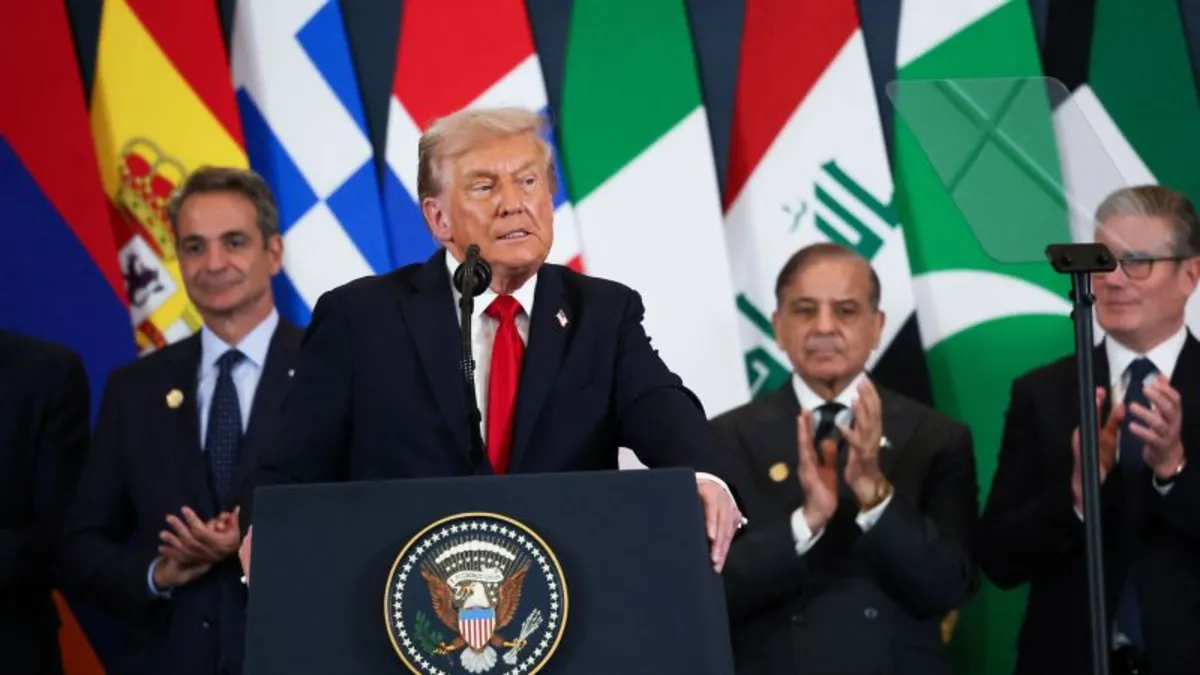
In recent days, Steve Witkoff, a seasoned real estate developer turned special presidential envoy for peace missions, has found himself at the center of international diplomacy. While attending a session in the Israeli Knesset, Witkoff listened intently as President Donald Trump celebrated a newly brokered ceasefire deal that secured the release of hostages. However, the president quickly redirected Witkoff's attention, stating, "We have to get Russia done. We got to get that one done," signaling the urgency of addressing the Iran nuclear deal and Russia's influence in global affairs.
Trump's recent accomplishments in the Middle East have ignited a sense of momentum, which he hopes to leverage in other diplomatic efforts. Following a whirlwind 36-hour trip to the region, Ukraine's president was welcomed to the White House, where he attempted to persuade Trump to authorize new long-range missiles before a pivotal meeting with Vladimir Putin in Budapest. Meanwhile, Trump confirmed the CIA's covert operations in Venezuela and extended support to Argentina's leadership, further showcasing his expansive geopolitical agenda.
“I think we carry a lot of momentum, a lot of credibility,” Trump stated during a lunch with Ukraine's leader. He highlighted the significance of the Middle East deal, remarking that many doubted its feasibility. “Nobody thought it could be done. That was one nobody thought could be done, and we got it done,” he added, emphasizing his administration's strategic positioning.
Despite this diplomatic success, translating it into further victories remains a formidable challenge. Recent tensions in the truce with Hamas have surfaced, particularly concerning the group's failure to return the remains of deceased hostages, leading to outrage in Israel. The leverage that Trump successfully wielded in the Middle East is not easily replicated with Russia and China, both formidable nuclear powers with their own strategic interests.
Many senior officials express skepticism regarding the immediate impact of Trump's Middle East success on Russian or Chinese strategies, particularly given the complex history of U.S. interventions in Latin America. However, Trump's experience in negotiating peace in Gaza serves as a reminder that prolonged and often challenging diplomatic efforts can yield results, even if those results are fragile.
As Trump pivots to address the situation in Ukraine, he appears to draw from his Middle Eastern negotiations. This week, he expressed a willingness to meet with Putin in Hungary, despite the lack of clarity regarding a potential peace deal. Some European officials suggest that to achieve a resolution in Ukraine, Trump may need to exert pressure on Putin through sanctions or military support, strategies he has yet to fully embrace.
In conversations with Ukrainian President Volodymyr Zelensky, Trump conveyed a cautious stance regarding the provision of long-range missiles. “Hopefully they won’t need it,” he remarked, indicating a preference for diplomatic resolution over military escalation. This reflects Trump's historical tendency to oscillate between pressure tactics and conciliatory approaches in international negotiations.
The anticipated summit with Putin, potentially occurring within the next two weeks, will coincide with another significant meeting with President Xi Jinping of China. These back-to-back engagements aim to address pressing global issues, including trade tensions and the ongoing conflict in Ukraine, which has seen support from Beijing towards Russia.
Trump's optimism regarding a resolution in Ukraine echoes his sentiments from previous diplomatic encounters, though historical precedents caution against complacency. While he expresses confidence that Putin desires to conclude the conflict, many remain skeptical about Russia’s genuine intentions.
As Trump continues to navigate the complexities of international diplomacy, the task of achieving lasting peace remains fraught with challenges. With key meetings on the horizon and ongoing negotiations, the delicate balance of power, interests, and strategic relationships will play a critical role in shaping the outcomes of these high-stakes discussions. The coming weeks will undoubtedly test Trump’s diplomatic acumen as he seeks to extend his momentum from the Middle East to other critical global issues.